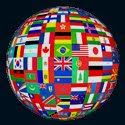It was John Locke who wrote, “The state of nature has a law of nature to govern it… that all being equal and independent, no one ought to harm another in life, health, liberty, or possessions…" (in Second Treatise of Government). Beautiful words indeed, but often taken ever so lightly. There are many kinds of harm: intentional, unintentional, accidental, cognitive, emotional, behavioral, and the list goes on. I myself am no stranger to unintentional harm, something I’m sure I share with many of my readers. Harm is something that is easy to cause and difficult to amend. The harm we cause can often go unnoticed for years, but have lasting effects for generations to come.
John Locke spoke of natural law, a theory which may not be vividly supported in modern law, but which inspired Constitutions, Bills of Rights, and many of the other legal frameworks that represent the foundation of Human Rights as we know them. Moral philosophers like John Lock, among many many others, asked themselves what rights we needed to grant each other and what obligations we needed to assume in order to build healthy and prosperous societies. Life, health, liberty, and possessions came to be the main building blocks in modern social designs.
This is why when speaking of perpetual poverty, unhealthy living conditions, genocide, and torture, among others, we can speak of violations to “basic” or “fundamental” Human Rights. Hundreds of countries all over the world have signed international treaties that obligate their governments to respect and ensure these rights. Human Rights treaties obligate governments to uphold ethical principles that foster dignity and prosperity. It is understood that when a person is deprived of their health, their liberty, and their possessions that person is deprived all things that can ensure their life. And life is at the top of the rights our legal frameworks are designed to protect.
Life: the cornerstone of all rights. Once life is lost all other rights simply wither away, for there is no sense in ensuring health, liberty, and possessions to the dead. Life gives rights themselves their meaning. Life can be protected in many ways. Most governments have criminal laws that make their citizens feel their lives are “protected” –but we all know criminal law is mostly corrective. Attempts against life are usually “punished” and not “prevented” with criminal law, what ensures life is not simply punishing attempts against it, but providing the necessary social, economic, and educational conditions for life to be sustainable.
Today, almost ten thousand bloggers around the world are participating in an international effort to sustain life: Blog Action Day. It is an effort to provide the social, economic, and educational conditions necessary to promote health, liberty, and life. Today humanity is facing a challenge. Indiscriminate use of natural resources coupled with massive pollution has lead to consequences that threaten life as we know it. Life, the moral value we have sworn to uphold in our legal frameworks and constitutions. The moral value we placed at the top of our treaties. The moral value protected in almost all our religious books, regardless of our religions. Our inaction, our failure to draw out effective legal frameworks, our violations to the Kyoto protocol, our inability to find ways to promote economic growth while protecting our planet is threatening the health of those who live in the areas that are most highly affected by the main consequence of our actions: climate change.
At the most critical point in time, our world leaders have decided to revaluate our priorities. Life is being threatened, the legal frameworks based on our moral and ethical principles have proven insufficient. Our world leaders have realized the commitment we made to uphold life in our treaties and constitutions entails more than just creating laws that “punish” crimes against life. They have realized that our disregard for the environment will, in the long run, constitute a crime against life, but it will be one we can neither punish nor correct, only endure. They have realized that just as certain social, economic, and educational standards are required for a healthy and prosperous society, certain environmentally-friendly social, economic, and educational standards are necessary to sustain life. Because of that, a new legal framework will be drawn out in Copenhagen this year: one which needs to be far more ambitious than the Kyoto protocol, one that contemplates economic growth in ways that do not harm our environment, one which ensures sustainable development while protecting basic human rights. Our world leaders have realized the ethical commitment we, as societies, have made to protecting life entails an ethical commitment to protecting the environment that makes life physically possible, thus turning our ethical obligation to the environment into an ethical obligation to ourselves.
To learn more about climate change, the new framework being discussed in Copenhagen, the effects of climate change on poverty, or any other issue related to global warming, please visit: the WWF, 350.org, and the UN Climate Change Conference Blog.

+Dark+Backd.jpg)
1 comments:
Very interesting perspective about climate change.
Post a Comment